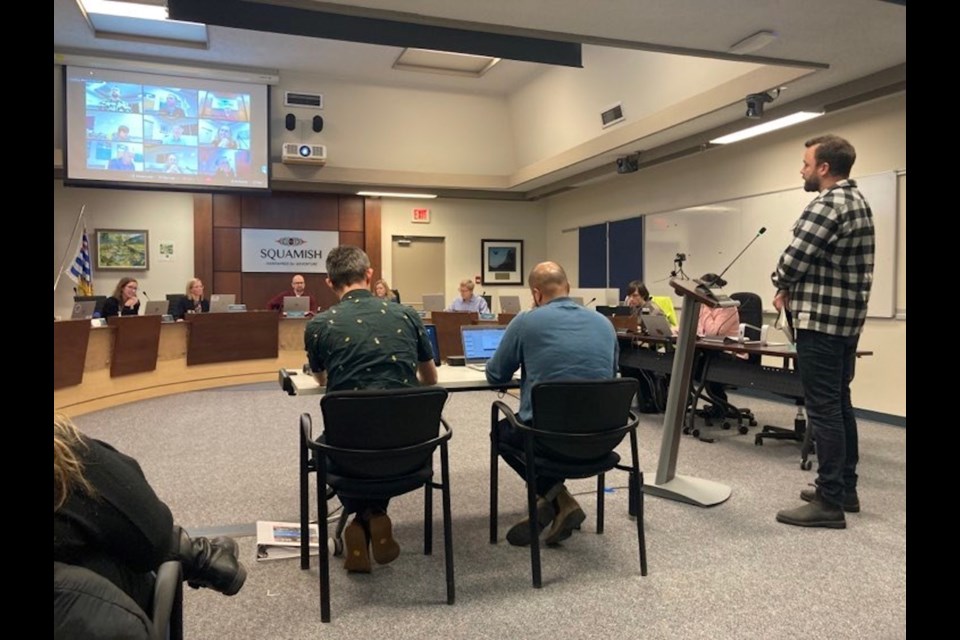Downtown south may soon see the construction of a three-storey building with a communal rooftop space for commercial and employment space.
oted 6-1 in favour of granting third reading to the rezoning permit for 37707 Second Ave. Coun. Lauren Greenlaw was the sole opposing vote. The application is expected to be adopted sometime in the near future.
The undeveloped 6,000-square-foot lot is currently zoned as I-1 light industrial. If the application passes adoption, it will become a CD-104 comprehensive development zone.
The proponent is Chris Hunter of
If the land becomes a CD-104 zone, it would allow the area to have a flexible variety of uses, including, among other things, alcoholic beverage manufacturing, arts and culture business and professional office, light industrial, commercial, service establishments and more.
Before council made its decision to approve third reading, a public hearing was held that same evening.
Neighbours speak
Several residents, most of whom live close to the property, raised a variety of concerns about the project.
Parking was a point of contention, with numerous speakers noting that ditches on either side of the road will force roadside parking to encroach on the street.
It's already a challenging place for residents to park a vehicle, as a nearby cidery and martial arts school attract a number of clients who spill out into the residential street, they said.
"It will directly affect my home and the family," said Caroline Miller, a resident of a neighbouring property.
"I realize that the plan is for tandem parking, but I question the functionality of this design, considering six of the spaces are for small vehicles, and many people drive trucks and large vehicles in Squamish."
She also wanted more clarity on what kinds of businesses would be setting up shop in the building and how many clients they would attract. These things impact parking and capacity issues in the area, she said.
Miller, along with a number of other speakers, noted that a restaurant would be allowed to set up shop in the building under the proposed zoning.
This raised questions about noise — especially given the rooftop space. There were also concerns about privacy and traffic, they said.
One speaker from the Garibaldi Highlands, Spencer Fitschen, said that the project was perhaps too flexible with its permitted uses.
He commended the idea of a building dedicated to employment space, but had a word of warning.
"The only thing that leaves me a little bit cautious, of course, is there's very little that you can't do through the proposed CD zone … I'm not sure I'm entirely comfortable with that."
What did the proponent say?
In response, the proponent of the project also made a few comments.
"I think the reality is the challenge with parking in downtown Squamish cannot be solved one parcel at a time," said Hunter. "It has to be a neighbourhood solution."
It's unfair to let this project be burdened with resolving parking issues in the area, he said.
He noted it was impossible to physically fit more parking stalls on the property.
With respect to the amount of flexibility for the uses, Hunter said this was a positive.
"That's the good thing about this neighbourhood. It's eclectic. It changes," he said. "You get great dense cities like Tokyo or small towns like Boise or Hood River — they're eclectic. They're gritty. They have lots of different uses next to each other."
Council perspectives
After elected officials heard the public comments, they had remarks of their own.
They generally had positive things to say about the proposal and echoed Hunter's statement that this project cannot be tasked with solving all parking problems in the neighbourhood.
Coun. Chris Pettingill spoke about vehicles in the area.
"We aren't going to solve our parking problems by bringing more cars downtown, and more parking needs more cars — more car problems," said Pettingill. "I think there are other solutions we need to look at for here."
However, Coun. Greenlaw, the sole elected official who voted against the project, had a different take.
"I have concerns about the functionality of the suggested building," said Greenlaw. "I appreciate it is difficult to develop these [small] lots. But that does not mean that we should be introducing buildings and potentially businesses that may not bring net benefits to the neighbourhood.
On the other hand, Mayor Armand Hurford threw his support behind the proposal.
"I think having just over 10,000 square feet of employment space downtown on such a small lot is actually quite remarkable," said Hurford.
"I understand the community's concerns around the broad uses and the potential risks that represents in the current state as to who the tenants are. I think that the smaller footprints of roughly just over 3,000-square-foot floor[s] really limits exposure to … the possible negative impacts there."




